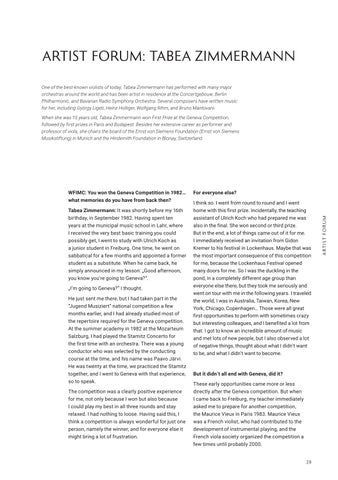ARTIST FORUM: TABEA ZIMMERMANN One of the best-known violists of today, Tabea Zimmermann has performed with many major orchestras around the world and has been artist in residence at the Concertgebouw, Berlin Philharmonic, and Bavarian Radio Symphony Orchestra. Several composers have written music for her, including György Ligeti, Heinz Holliger, Wolfgang Rihm, and Bruno Mantovani. When she was 15 years old, Tabea Zimmermann won First Prize at the Geneva Competition, followed by first prizes in Paris and Budapest. Besides her extensive career as performer and professor of viola, she chairs the board of the Ernst von Siemens Foundation (Ernst von Siemens Musikstiftung) in Munich and the Hindemith Foundation in Blonay, Switzerland.
Tabea Zimmermann: It was shortly before my 16th birthday, in September 1982. Having spent ten years at the municipal music school in Lahr, where I received the very best basic training you could possibly get, I went to study with Ulrich Koch as a junior student in Freiburg. One time, he went on sabbatical for a few months and appointed a former student as a substitute. When he came back, he simply announced in my lesson: „Good afternoon, you know you're going to Geneva?“. „I'm going to Geneva?” I thought. He just sent me there, but I had taken part in the “Jugend Musiziert” national competition a few months earlier, and I had already studied most of the repertoire required for the Geneva competition. At the summer academy in 1982 at the Mozarteum Salzburg, I had played the Stamitz Concerto for the first time with an orchestra. There was a young conductor who was selected by the conducting course at the time, and his name was Paavo Järvi. He was twenty at the time, we practiced the Stamitz together, and I went to Geneva with that experience, so to speak. The competition was a clearly positive experience for me, not only because I won but also because I could play my best in all three rounds and stay relaxed. I had nothing to loose. Having said this, I think a competition is always wonderful for just one person, namely the winner, and for everyone else it might bring a lot of frustration.
For everyone else? I think so. I went from round to round and I went home with this first prize. Incidentally, the teaching assistant of Ulrich Koch who had prepared me was also in the final. She won second or third prize. But in the end, a lot of things came out of it for me. I immediately received an invitation from Gidon Kremer to his festival in Lockenhaus. Maybe that was the most important consequence of this competition for me, because the Lockenhaus Festival opened many doors for me. So I was the duckling in the pond, in a completely different age group than everyone else there, but they took me seriously and went on tour with me in the following years. I traveled the world, I was in Australia, Taiwan, Korea, New York, Chicago, Copenhagen… Those were all great first opportunities to perform with sometimes crazy but interesting colleagues, and I benefited a lot from that. I got to know an incredible amount of music and met lots of new people, but I also observed a lot of negative things, thought about what I didn't want to be, and what I didn't want to become.
But it didn´t all end with Geneva, did it? These early opportunities came more or less directly after the Geneva competition. But when I came back to Freiburg, my teacher immediately asked me to prepare for another competition, the Maurice Vieux in Paris 1983. Maurice Vieux was a French violist, who had contributed to the development of instrumental playing, and the French viola society organized the competition a few times until probably 2000. 39
A RT I S T F O R U M
WFIMC: You won the Geneva Competition in 1982… what memories do you have from back then?
